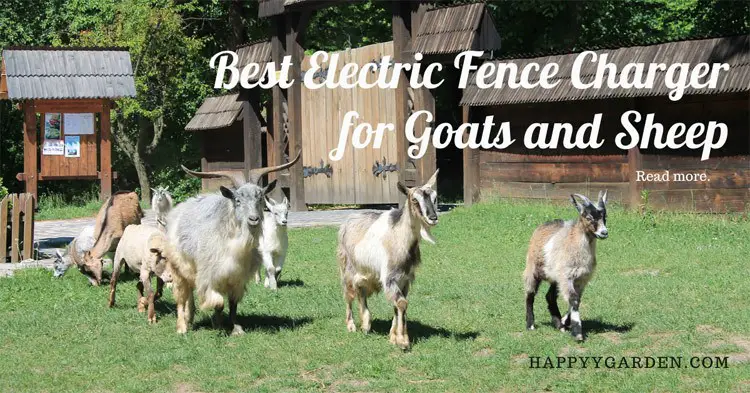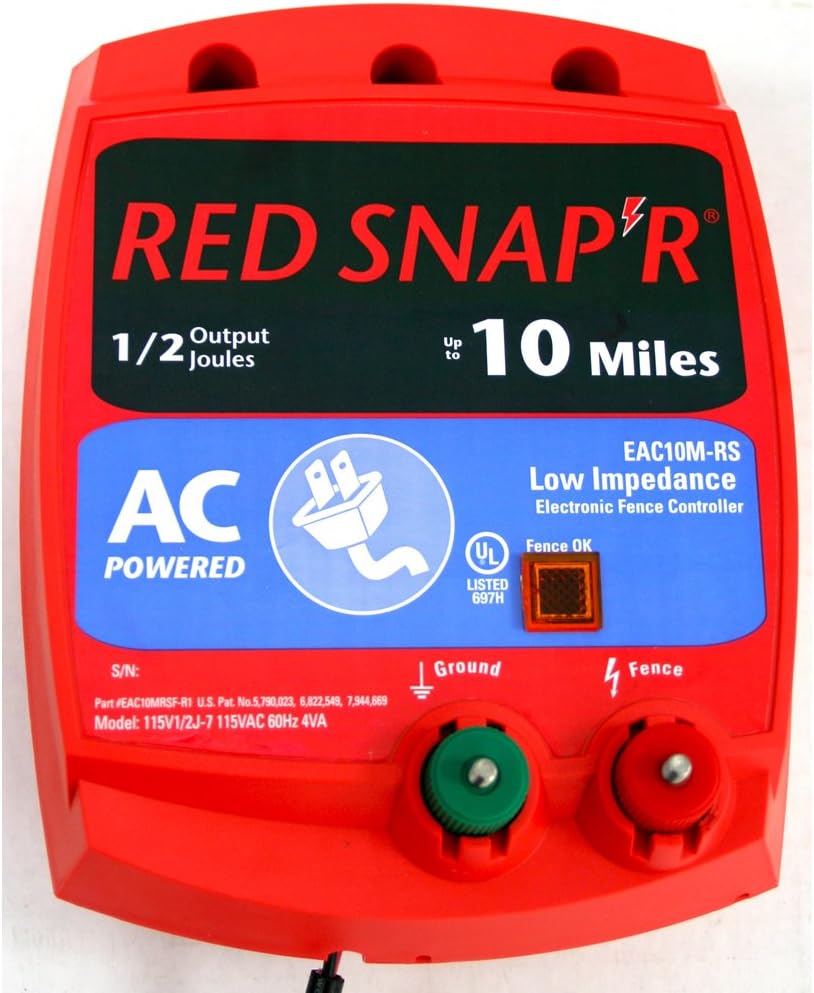6 Best Electric Fence Charger for Goats and Sheep
Goats and sheep are some of the most challenging animals to contain in a pasture. They are notoriously curious animals; it is, therefore, essential to use the best electric charger for goats and sheep to encompass them. Occasionally, they will push against the fence or jump over them to graze on the other side of the wall. Having to chase the goats and sheep back to the pasture is tiresome and frustrating.
Goats and sheep love freedom; they are enjoying walking around without too many restrictions. In addition to their small physic, they have excellent escaping skills. Even though some species of goat and sheep that thick coats that insulate them against electric shock, the electric fence remains the best way of containing these types of animals. To avoid the worry of regularly checking your goats and sheep, you need a highly visible, economical and hard-wearing
Table of Contents
Top 6 Electric Fences for Goats and Sheep
Are you for the best electric fence charger for goats and sheep? New technology has seen an increase in the variety of electric fence chargers in the market. Therefore, selecting the most appropriate one for your electric fence can be quite an overwhelming exercise. The list below is well analyzed and is meant to make your work in the market hustle free. Carefully read through the choices given below before choosing one that suits your needs perfectly.
Image | Product | Rating | Price |
|---|---|---|---|
Zareba electric fence charger is ranked as the best as we choose. This electric fence charger can cover an electric fence of 25 miles. It has low impedance and 1.0 joules output. The best part about it is that it is suitable for most types of electric fences for goats.
Features
It can comfortably electrify 25 miles of electric fence. With 1-joule output and 115 voltage, it is suitable for all types of fences. Furthermore, its efficiency is enhanced by a 1-second pulse interval. If you are looking for an electric fence charger with a fuseless design, this is the charger too.
Features
If you are looking to cover a large pasture, this is the most suitable electric fence charger for you. It can be used for multi-wired electric fences as well as single fences because of the more than 6.3 joules and is computer-controlled. Also, the electric fence charger can charge more than a barrier of 50 miles.
Features
This fence charge is another suitable option for large pastures. It has low impedance and can cover an electric fence of up to 100 miles. It comes with a digital meter displaying potential difference on the electric fence.
Features
The five-acre coverage electric fence is a light-duty energizer that can electrify only a mile of an electric fence. The electric fence charger does not rely on electricity since it has 2d battery cells. Best charging option for areas with unreliable on no electricity coverage.
Features
With 0.5 joules, this charger can sure keep your goat and sheep in and predators away. It has low impedance and can cover up to 10 miles of electric fence. Heavy weed has no much impact on this type of electric fence charger.
Features
Choosing the Most Suitable Electric Fence
When designing an electric fence for your goats and sheep, there are essential factors to put into consideration. You don't just go into the market and pick an electric fence charger. Here are the factors to consider.
Characteristics of Animals
You know and understand the behavior of your animals well. If your goats and sheep are notoriously cheeky, you need a fence with higher voltage probably higher than 4000 volts. Also, the slats should be as carefully placed as possible. Other characteristics to consider when choosing a wall are coat thickness and hooves. Even with an electric fence, the animals can use their feet to destroy the wall, and the bottom line is you need a sturdy barrier, whether electronic or not.
Purpose of Your Fence
What is your primary goal of fencing? Are you trying to protect your goats and sheep or keep them in the pasture? If the sole fence purpose is to keep the sheep and goats at bay, a fence charger of between 3000 and 4000 volts is required. However, if you are trying to keep your animals in the pasture at the same time protecting them from strayed dogs or wolves, you need a fence charger of up to 5000 volts. These animals have thicker skin compared to that of goats and sheep.
Type of fence
There are four types of electric fences. Well, I have heard people argue that electric fences are dangerous and may cause harm to your animals. That is not true, and an electric fence is designed not to cause any damage to your animals. When they come into contact with wires, it stings them a bit. Furthermore, a few zaps will train them to stay away from the fence. There are four types of fencing to consider. They include;

electric fence not shocking goats
About The Electric Fence Chargers For Goat And Sheep
While containing your goats and sheep, their safety is an important issue to recognize. Too high voltage fence chargers could hurt or even kill your animals. The best electric fence charge for goats and sheep is one that maintains 4000 to 5000 volts on the line. In a situation where you are also protecting your animals against dangerous predators such as wolves, a fence charger able to maintains a minimum of 5000 volts is required.
Fence Charger Terminologies
Continuous output – The term continuous output means there is a constant charge on hot wires and not to pulsing wires. This charger system is recommended for dairy stalls and small paddocks.
Low impedance – The term low impedance is meaningless resistance by the charger hence more power pushing through the fencing wire.
Solid-state – It is a fence charger that delivers medium amperage shock in medium duration. They are the best fence charges choice for goats and sheep, especially the small short-haired animals in a light weed pasture.
Types of Fence Charges
The type of fence charger home depends on the fence controller functions. Each type of fence charger has a specific situation that makes it most suitable for use. Selecting the best one is critical for keeping your animals controlled and safe. Here are three main types of electric fence chargers;
- AC Powered
- DC powered
- Solar Powered
AC Powered
AC powered an electric fence is a great option only if you have a reliable 110 volts electric power, and electronic controllers placed at a range of 200 miles apart. Of all electric fence chargers, AC powered provides the best power output and is popularly used for permanent electric fence systems.
DC Powered Electric Fence
This type of electric charger is most suitable for remote areas without access to AC power. Some of the batteries used by the DC-powered electric fence are 6 volts, 12 volts, 4 volt, or D cells. Batteries are sold differently from the chargers. While some of these batteries are rechargeable, others are used once then replaced.
How does a DC-powered electric fence take before it is charged or replaced depends on the number of times the barrier is grounding? If you have notorious animals or weeds touching the wall or a regular basis, the battery will drain faster. The animals will affect the fence more during the early stages of their training hence drain the battery more quickly.
Solar Powered
Another alternative for a remote area is the solar-powered electric charger. They are easily portable, which makes them a perfect choice for rotational strip grazing. A solar-powered electric fence comes with a battery for energy storage. The most used battery lead-acid battery, which lasts for close to three days without charge or 1000 of constant charging.

How to choose the right electric fence charger
Factors to Consider When Choosing the Right Electric Fence Charger
The heart of any electric fence lies in the fence charger. It is imperative to contain or exclude animals in or from your pasture. Some of the factors to consider to ensure you buy a fence charger that meets your needs include.
Powering the Fence Charger
If you have reliable power, I would recommend an AC-power charger for your electric fence. However, if you are in a remote location with no or unreliable electricity, DC or solar-powered chargers are excellent choices.
Type of Fence Line
Compared to rope, tape, or poly wire, steel wires create less electrical resistance hence draws more power. I would recommend a low-impedance fence controller for tape or poly-rope. Also, aluminum cables have less resistance ability than steel wires.
- Number of Wire Strands on The Fence
The general rule of electric fencing is that you divide the charger distance depending on the number of strands. The mileage rating depends on the power need. The more wires on the electric fence, the more power required.
- Amount of Weed
Weeds touching the fence tend to draw power away from your charger. The best charger under search circumstance is the low impedance fence controller since they can maintain high energy even when power is drawn from the weed. (Read more: Best Herbicide For Fence Lines That Control Weeds In Your Farm: https://happyygarden.com/best-herbicide-for-fence-lines/)
- Area to Enclose
As you purchase in our list above, keep the possibility of future expansion in your mind. Therefore, a more powerful electric fence may be required.
- Type of Animals
Bigger and stronger animals have thicker hair and bigger hooves and therefore require a more durable shock. Such a fence requires more powerful fence chargers. In this case, goats and sheep need between 3000 to 4000 volts.

See how to install electric fence charger for goats
Installing A Fence Charger
All fence chargers come with a detailed installation manual. When installing an electric fence charger, here are some of the factors to put into consideration.
- The electric fence charger should be accessible to the ground rod system separate from the grounding rods.
- It is sheltered from the weather except for the solar chargers.
- Should be close to 110-volt AC power source except for battery or solar-powered chargers.
Installation Procedure
- Using screws or nails, mount the charger off the ground
- Connect ground wires with ground terminals and rods using insulated wire
- Connect the fence terminal with the fence wire with 20,000 volts or more to hook up the wire
Learn more on to install a solar-powered electric fence charger by watching this video:
Conclusion
When choosing the best electric fence charger for goats and sheep, the most important features to consider are low impedance fence coverage, energy output, ease of use, durability, and safety. While containing your goats and sheep, their safety is an important issue to consider. Too high voltage fence chargers could hurt or even kill your animals. The best electric fence charge for goats and sheep is one that maintains 4000 to 5000 volts on the line. If you are protecting your animals against dangerous predators such as wolves, a fence charger that supports a minimum of 5000 volts is required.








